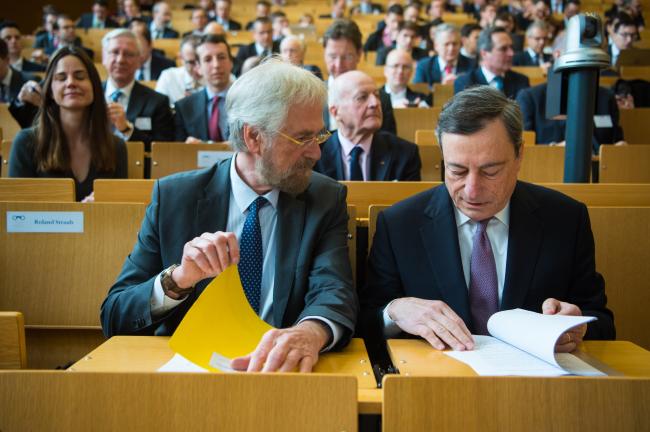(Bloomberg) -- Some of the European Central Bank’s heavy hitters are laying the groundwork for action.
The top economist and the market chief at the Frankfurt-based institution have already signaled they’re discussing options in case the current euro-area slowdown worsens. There have been similar hints from Francois Villeroy de Galhau, who is the Bank of France Governor and a potential contender to be next ECB president.
The backdrop is a recession in Italy, stagnation in Germany, and a sharply changed outlook for the 19-nation euro area. Investors have also responded, with the euro near its weakest since mid-2017 and the yield on 10-year German bunds threatening to go negative for the first time since 2016.
“It’s clear the ECB is nervous,’’ Steen Jakobson, chief economist at Saxo Bank, said on Bloomberg Television. After saying last year that the “policy of support had worked and Europe had turned a corner, here we are and they are almost in a panic mode in terms of what they need to do.”
While the ECB’s current language -- that interest rates won’t rise at least through the summer of 2019 -- leaves open the chance of a hike later in the year, the likelihood has very much faded. That’s the message now coming from policy makers, and traders in money markets aren’t pricing the first 10-basis-point hike until June 2020.
On Thursday, The ECB will publish the account of its January meeting, when President Mario Draghi said risks to the outlook had moved to the downside -- a meaningful shift in ECB language. That report, which may reveal the extent of policy makers’ concerns, comes a day before Draghi is due to speak in Bologna, Italy.
Beyond that, it’s all eyes on the ECB’s March meeting, when some expect it to announce a new round of long-term loans to banks. Much depends on the next few weeks of data and the new economic forecasts. Praet could give more insight into the institution’s thinking when he speaks in four different locations this week.
Indicators have continued to weaken since the ECB’s December projections, which saw growth this year of 1.7 percent and inflation at 1.6 percent. By comparison, consensus forecasts for both in Bloomberg’s monthly survey of economists is lower, at 1.4 percent.
But as Praet points out, it’s not all gloom and doom as unemployment continues to decline. Bundesbank President Jens Weidmann and next ECB chief economist Philip Lane have warned against overreacting as the environment is just too uncertain.
In Germany, the region’s powerhouse, investor confidence in the economic prospects improved for a fourth month in a row, a report by ZEW institute showed on Tuesday. While German growth will likely remain subdued at least through the first half of the year, there’s no reason for concern, according to the Bundesbank.
The ECB could opt to wait for the horizon to clear first. Finnish central bank governor Olli Rehn, among the frontrunners to succeed Draghi later this year, believes policy makers still have some time before the summer to take the decision on deploying new loans to banks known as TLTROs.
Officials are keen that any new loans aren’t seen as a handout to banks, but are designed to ensure households and companies can borrow easily and cheaply, helping to grease the wheels of the economy amid a global slowdown. The ECB will assess in March whether that continues to be the case, Praet said.
(Adds ZEW report in 10th paragraph.)
